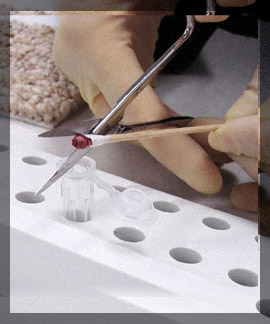Archival Notice
This is an archive page that is no longer being updated. It may contain outdated information and links may no longer function as originally intended.
Home | Glossary | Resources | Help | Contact Us | Course Map
By rule, statute, or law, most jurisdictions provide for defense inspection of physical evidence relevant to the case. Several states explicitly provide for the retesting of DNA-related evidence by a defendant [See Iowa Code Ann. §813.2 (Rule 13(2)(b)(1); La. Code Crim. P. Art. 718 (West 1981); Wis. Stat. Ann. §971.23(5) (West 1985)]. Other jurisdictions have held that a defendant's right to conduct retesting of evidence in the prosecution's possession is implicit in the right to inspect [State v. Crabtree, 482 S.E. 2d 605; 198 W. Va. 620 (W.V. 1996)].
Ethical issues surrounding independent typing by the defense may arise at the pretrial, trial, post-conviction, or appellate stage of a prosecution. Prosecutors may want to make a pretrial record of the availability of an evidence sample.
Postconviction motions for additional and/or independent DNA typing may be framed by the defense as an ethical obligation of the prosecutor, one which cannot be denied. A prosecutor can counter such motion by offering to perform such typing pretrial. This will weaken a claim of unethical conduct by the prosecution in later refusing to conduct post-conviction DNA typing.
Additional Online Courses
- What Every First Responding Officer Should Know About DNA Evidence
- Collecting DNA Evidence at Property Crime Scenes
- DNA – A Prosecutor’s Practice Notebook
- Crime Scene and DNA Basics
- Laboratory Safety Programs
- DNA Amplification
- Population Genetics and Statistics
- Non-STR DNA Markers: SNPs, Y-STRs, LCN and mtDNA
- Firearms Examiner Training
- Forensic DNA Education for Law Enforcement Decisionmakers
- What Every Investigator and Evidence Technician Should Know About DNA Evidence
- Principles of Forensic DNA for Officers of the Court
- Law 101: Legal Guide for the Forensic Expert
- Laboratory Orientation and Testing of Body Fluids and Tissues
- DNA Extraction and Quantitation
- STR Data Analysis and Interpretation
- Communication Skills, Report Writing, and Courtroom Testimony
- Español for Law Enforcement
- Amplified DNA Product Separation for Forensic Analysts


